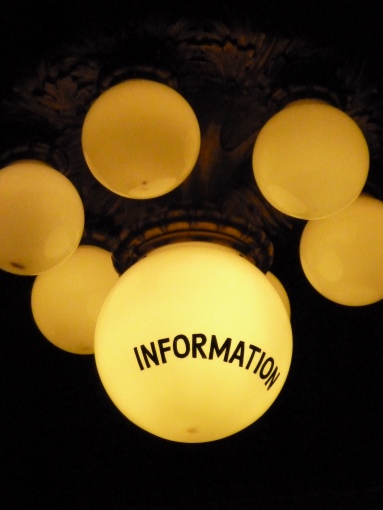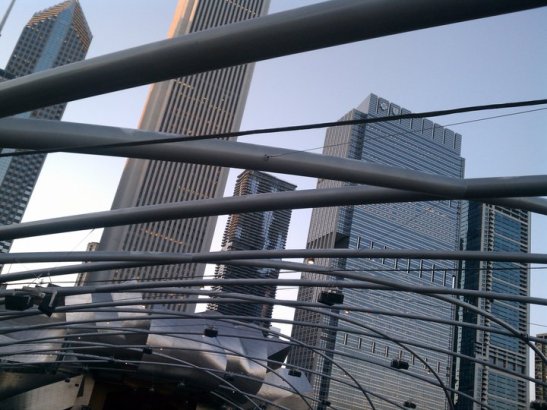Out with the old …
Newspapers across the U.S. continue to slim down. This journalist was the casualty of yet another round of layoffs at yet another paper. How, then, can good science be shared?
I was looking forward to seeing my very first vaccine story in a mainstream newspaper last Tuesday. It was an explanatory piece, not as science-heavy as I would have preferred, but a piece that once again helped set the record straight about vaccines.
They are not linked to autism, in case you haven’t heard.
But my enthusiasm for the story was shaken by an even bigger event the preceding Monday afternoon. I got laid off.
It was a shock. To me, to my colleagues, to friends and family, to sources. In the 21 months I was at the paper, I had embraced everything they threw at me:
“Oh, I need to contribute regularly to a blog? On it.”
“Ah, so you want me to use this iPhone to shoot, edit and voice-over my own video? I got it.”
“Handle directions from multiple editors with competing interests because my role is an amorphous, health-science, daily, general-assignment, enterprise-and-project-reporter mash-up? You got it.”
I was an eager part of the ever-evolving game of adapt and catch-up that newspapers around this country are playing in their hope to survive. But still, it didn’t matter.
I quote someone at the paper with whom I was close (but I leave their identity unknown as this person is still there):
“It kills me to know that someone who actually loved working here, someone with such positive energy, a love of journalism and such a hard-working employee would be chosen to leave over others.”
My lay-off was not performance-based. I actually received a glowing review this year, completed just two months ago, and one of the highest raises in the newsroom. I was supposed to remain quiet about that, but it matters little now.
So being let go, despite all the talk, despite the layoffs across my paper’s parent company, Gannett, in recent weeks, came as a complete and utter surprise — one I would rather never have to live with again.
What has, however, been a pleasant surprise since then is the amount of support I have received from people who had come to know me and my work.
After the hangover wore off on Tuesday morning (amazing former colleagues took me out Monday night) I decided to walk to the coffee shop near my house. I wanted to address things like my social media accounts, which bore the brand of my former employer. On my walk, an unexpected phone call came in: one from the governor of my state.
He had heard about my layoff, fewer than 24 hours earlier, and called to express his condolences, among other things.
By Thursday, I had also heard from one of Delaware’s US Senators, whom I had worked with closely on covering health care reform. He had similar sentiments to share.
Over the next several days, I was surprised by how quickly word got around and by how much support was out there. I began fielding this offer and that. I was surprised by how much of an impact I had made in such a short time.
Which is also what makes me sad. In my role – though my heart belongs to science – I became quite passionate about health care policy. I was THE reporter covering the Affordable Care Act in the state, reading up daily on the happenings here and nationally. Without me, the paper won’t have anyone with the expertise I had gained, the sources and repertoire I had built.
Without me, that coverage will likely be weaker. That seems like a loss to the people who rely on it, the people who read the newspaper.
I also brought with me my background in science. And I always tried to bring science into the stories I wrote, as followers of this blog may know from some of my previous posts. One of the reasons I absolutely loved my job, though I didn’t get to cover science as heavily as I would have liked, was knowing I was bringing science to people in a place they weren’t expecting it.
Sitting at their kitchen table on a Tuesday morning, they might open the paper to read a story about nanoparticles and pediatric cancer or specialized nerve cells that help us map our surroundings. A cup of coffee and a small shot of science.
That won’t happen anymore. The impact is gone.
It got me thinking about the role of newspapers. Newspapers at one time were a beacon of public service. But the need to “monetize this and monetize that,” to make-up for tepid ad revenues and steep drops in circulation, have turned newspapers into bottom-line, by-the-numbers businesses. But their leaders haven’t figured out exactly how this business should be run.
Getting rid of good people is an unlikely strategy for success, but who am I to judge. It’s happening around the country, in big markets and in small.
It also got me thinking about the importance of communication. My former paper will, at least in the short term, suffer from the lack of expertise I provided. With my background in science, I brought a different perspective, a different approach and specialized knowledge. This was acknowledged in my review.
Without the platform of the newspaper, I will have to work even harder, think differently, about how I can help communicate important topics like science and health policy to a broader audience. The platform I had before decided it had no use for me.
But do people have a use for this information? Is it our responsibility to help them find it, even when the avenues for doing so become barricaded?
When it’s more profitable to explore Miley Cyrus’ fascination with twerking than it is to help people understand antibiotic resistance, in what kind of world have we chosen to live?
I am at a crossroads now. I was plucked from the journalism ground before I’d grown tall enough to reach the sky, but I don’t want this to be the end. I think I have a lot to share and I’ll be damned if I don’t want to help more people understand the issues in their world.
Science is valuable. We live with it, rely on it and will continue to need it well into the future. It’s something that should be accessible to everyone and I want to help people understand that it’s not so scary. But it’s also not so easy for science to have all the answers. It’s a process and it’s important to understand that as well, breakthroughs or not.
Good science communication is crucial, more so now than ever before. Fewer and fewer newspapers have the people who can do it. I can think of at least one that now has one less (but thankfully, my former paper still has two fantastic journalists who routinely cover the environment).
As science journalist Robert Bazell told Amanda Alvarez last month:
“The only way to become a science journalist is to do it. Build up a record online, or in a magazine. Local neighborhood websites are exploding. People care about local stuff, local medical or research facilities, or even stuff bordering on science and health, like their neighborhood garbage pickup and how that’s working. You need to be creative about the possibilities.”
For me, it’s time to get creative.




Your spirit lifts my soul! The readers (and I) will miss you, KT. God help The News Journal.
Thank you, Eric!
Kelly,
You are a well educated journalist with a clear understanding of how science links itself to educating us about healthcare. I am so sorry that your adventures in journalism at the newspaper were so short lived. You clearly have a lot to contribute. I know that one of your co-writers misses you, and your insight and your love of writing. As the mother of that co-writer. I want you to know that you have changed her life. We will hear great things about you in the months to come. I know you will be engaged in your pursuit of finding a job, I just wanted you to know how you touched my daughters heart with your friendship and skilled expertise in your field. I am sure in your 22 months at the paper you were a perfect employee. You were and more than that a good co-worker and friend. I hope to see you again doing great things.
Fondly,
Kathleen Kelly
mother of a former co-worker
That former co-worker has a wonderful mother =). Thank you, mama Kelly!
Sorry to hear about your layoff. Don’t try to find a logic to the why of it; that is to go to a place you really don’t want to go.
I don’t have the facts but I’ll hazard a guess that there are more ex-News-Journalists working in the region then there are ones–all future ex-News-Journalists, too, sad to say–still under the thumb of Gannett and I suspect they all are available for support, tips and leads. Ask around. You’ll see.
Good luck with life after A) the News Journal and B) big media journalism as well. It is a shame though that a career–a dependable job with sufficient compensation and security to maintain a family–as well as a profession–peer review/ethical standards–is no longer a given, or even an option, in journalism; that corporate journalism has become infotainment/PR-for-hire and real journalism–for better or worse–is left to the bloggers and twitterers.
Don’t give up. Get another degree; learn new communication technologies. Like you say, get creative.
Further reading…
Commodification of journalism:
http://www.theonion.com/articles/let-me-explain-why-miley-cyrus-vma-performance-was,33632/
Commodification of journalists:
http://newsosaur.blogspot.com/2013/09/how-can-they-fire-photographers-easy.html
Kindred spirit and friend from 2nd grade:
http://www.ssec.wisc.edu/~billh/g/Singularity_Notes.html
”Who says gannett isn’t innovative?…” is from me:
http://gannettblog.blogspot.com/2013/08/estimated-layoffs-other-job-cuts-now_24.html?showComment=1377617308568#c104382192685134432
Howard, thank you. The support system around here in this tiny state is fantastic. Thanks for the links, too.
This is a very thoughtful, frank piece that’s both personal and dispassionate. You appear to be a tremendous loss to journalism. I was a Gannett reporter many years ago and have followed the sad decline of the company’s standards. Gannett has always been money-obsessed, but they used to care about journalism and community service — not as much as other media companies, but it was there. Now, however, I do think they’ve gone totally over to the twerking side of the street. You should probably begin looking at medical centers, hospitals and research institutions for communications jobs. They have an increasing need for people to help them tell their stories themselves, because the mainstream media hasn’t the interest nor the horsepower to do it anymore.
Hi John, thank you so much for your thoughtful response. I am certainly exploring my options and have found some pretty great opportunities. I hope things have worked out well for you!
Kelly.
You did great work at the News Journal and this was a blog entry I wish I could have written. Talking with you earlier this year at the SPJ meeting gave me hope for the future of our craft. I have yet to figure out the logic of what took place. Talent obviously meant nothing. I went through your experience about a year and a half ago and there is nothing I can say that will make it easier. I am confident you will do well. For now, keep blogging and know a lot of people are pulling for you.
Thanks, Doug.
Pingback: The Power of the Pen | Figure One